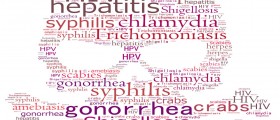
Gonorrhea is a sexually transmitted disease triggered by a bacteria named Neisseria gonorrhoeae. Therefore, vaginal, oral or anal sex may be ways of transmission of the disease from one person to another, even in cases when symptoms of this condition are not present. Moreover, an infected mother may transfer gonorrhea onto her newborn. However, sharing towels, using the same doorknobs or toilet seats are not situations through which you might contract gonorrhea.
Symptoms of Gonorrhea
If a female contracts this bacterial infection, she might or might not show any symptom. However, as the infection becomes gradually worse, the symptoms are bound to appear. Commonly, a burning sensation during urination or a presence of a yellow and green discharge from the vagina are both signs of an ongoing gonorrhea infection. Additionally, this condition may provoke vaginal bleeding, even between two menstrual periods.
Once this condition evolves, it may affect the Fallopian tubes, leading to pelvic inflammatory disease, manifesting through pain, discomfort and fever. The pain may get worse during sexual intercourse, when all the other symptoms may become more prominent too.
As for males, their gonorrhea infection manifests through symptoms like burning sensation, being the most common sign, along with a yellow-white discharge oozing out of the tip of the penis.
Facts about Gonorrhea
Once a person contracts gonorrhea, he/she experiences symptoms up to a week afterwards. Yet, women may encounter symptoms much later than men. Nevertheless, gonorrhea should not be left untreated since then it can evolve and make matters worse, causing infertility and pregnancy complications in women while leading to testicle swelling and infertility in males. With both sexes, gonorrhea may affect other parts of the sufferer's body too, attacking one's eyes, throat, brain, heart, skin, joints etc.
Treatment for Gonorrhea
Timely reaction is crucial for a successful treatment of gonorrhea. Thus, if you believe that you or your partner are infected with this bacteria, seek medical assistance as soon as possible. Once the health practitioner examines your urine or genital discharge, he/she will be capable of establishing a diagnosis.
If the test results are positive, the treatment will include antibiotics. People you have had sex with should seek medical assistance too, since they are likely to be infected as well. Finally, since prevention is better than treatment, use a condom during every sexual intercourse and do not change partners often. Of course, abstaining from sex completely is the best means of prevention, but this is a bit too radical. Thus, do your best to protect yourself and prevent gonorrhea.

















Your thoughts on this
Loading...